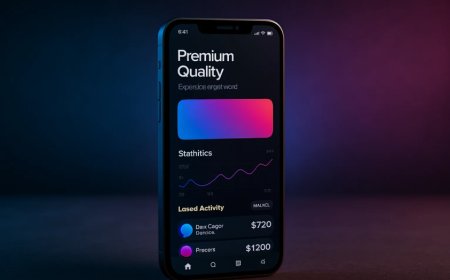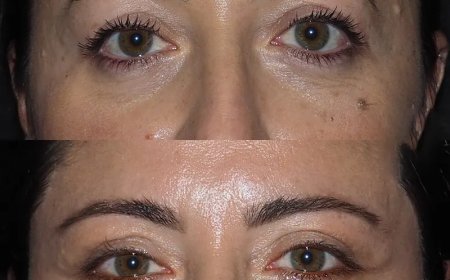Sudden Headache Causes and Management: A Comprehensive Guide
Headaches are a common ailment that most people experience at some point in their lives. While some headaches develop gradually, others strike suddenly, causing significant discomfort and sometimes alarm.

Headaches are a common ailment that most people experience at some point in their lives. While some headaches develop gradually, others strike suddenly, causing significant discomfort and sometimes alarm. Sudden-onset headaches can range from mild to severe and may be triggered by a variety of factors, from benign causes like stress to more serious conditions requiring immediate medical attention. In this comprehensive guide, well explore the causes of sudden headaches, their symptoms, potential treatments, and when to seek medical help. This blog is designed to provide you with a thorough understanding of sudden headaches and empower you to take appropriate action.
Understanding Sudden Headaches
Sudden headaches, also referred to as acute-onset headaches, are characterized by their rapid onset. Unlike chronic headaches that develop over time or recurring headaches like migraines, sudden headaches can appear within minutes or even seconds. They may last for a short period or persist for hours, depending on the underlying cause. Understanding the potential triggers and mechanisms behind these headaches is key to managing them effectively.
Sudden headaches can be broadly categorized into primary headaches, which are not caused by an underlying medical condition, and secondary headaches, which are symptoms of another issue. Below, well dive into the most common causes of sudden headaches, their symptoms, and how to address them.
Common Causes of Sudden Headaches
1. Tension Headaches
Tension headaches are among the most common types of headaches and can sometimes have a sudden onset. These headaches are often described as a tight band around the head or a feeling of pressure.
-
Causes: Stress, poor posture, eye strain, dehydration, or lack of sleep can trigger tension headaches. Sudden emotional stress or prolonged screen time may lead to a rapid onset.
-
Symptoms: Mild to moderate pain, tightness in the forehead or back of the head, and tenderness in the scalp or neck.
-
Management: Over-the-counter pain relievers like ibuprofen or acetaminophen, stress management techniques (e.g., deep breathing, meditation), hydration, and rest can help alleviate tension headaches. Improving posture and taking breaks from screens can also prevent recurrence.
2. Migraine Attacks
Migraines are a type of primary headache that can come on suddenly, especially in individuals with a history of migraines. They are often more severe than tension headaches and accompanied by additional symptoms.
-
Causes: Triggers include hormonal changes, certain foods (e.g., caffeine, chocolate), bright lights, loud noises, strong smells, or changes in weather. Emotional stress or lack of sleep can also precipitate a sudden migraine.
-
Symptoms: Throbbing or pulsating pain, often on one side of the head, sensitivity to light and sound, nausea, vomiting, and visual disturbances (aura) in some cases.
-
Management: Resting in a dark, quiet room, applying cold or warm compresses, and taking prescribed migraine medications (e.g., triptans) can help. Preventive measures include identifying and avoiding triggers, maintaining a regular sleep schedule, and staying hydrated.
3. Cluster Headaches
Cluster headaches are rare but extremely painful headaches that often strike suddenly and occur in cycles. They are considered one of the most severe types of headaches.
-
Causes: The exact cause is unknown, but cluster headaches are linked to abnormalities in the bodys biological clock and may be triggered by alcohol, smoking, or certain medications.
-
Symptoms: Intense, burning, or stabbing pain, usually around one eye or temple, accompanied by red or watery eyes, nasal congestion, or restlessness. Attacks typically last 15 minutes to 3 hours.
-
Management: Oxygen therapy, triptans, or other prescribed medications are often used to treat cluster headaches. Preventive treatments, such as calcium channel blockers, may be prescribed by a healthcare provider.
4. Thunderclap Headaches
Thunderclap headaches are sudden, severe headaches that reach maximum intensity within seconds to a minute. These are considered a medical emergency due to their association with serious conditions.
-
Causes: Potential causes include subarachnoid hemorrhage (bleeding in the brain), cerebral aneurysm, stroke, or reversible cerebral vasoconstriction syndrome (RCVS). These conditions require immediate medical attention.
-
Symptoms: Excruciating pain, often described as the worst headache of your life, accompanied by nausea, vomiting, neck stiffness, or loss of consciousness.
-
Management: Seek emergency medical care immediately. Diagnostic tests like a CT scan or lumbar puncture may be performed to identify the cause, and treatment will depend on the underlying condition.
5. Dehydration
Dehydration is a common and preventable cause of sudden headaches. It occurs when the body loses more fluid than it takes in, affecting normal brain function.
-
Causes: Inadequate water intake, excessive sweating, diarrhea, vomiting, or alcohol consumption can lead to dehydration.
-
Symptoms: Throbbing headache, dizziness, fatigue, dry mouth, and dark urine.
-
Management: Rehydrating with water or electrolyte-rich drinks can resolve dehydration headaches. In severe cases, intravenous fluids may be necessary. Preventing dehydration involves drinking adequate water daily and avoiding excessive caffeine or alcohol.
6. Caffeine Withdrawal
For individuals who regularly consume caffeine, sudden cessation can lead to withdrawal headaches.
-
Causes: Abruptly stopping caffeine intake, such as missing your morning coffee, can cause blood vessels in the brain to dilate, leading to a headache.
-
Symptoms: Throbbing pain, fatigue, irritability, and difficulty concentrating.
-
Management: Gradually reducing caffeine intake can prevent withdrawal headaches. Drinking a small amount of caffeine may alleviate symptoms, but long-term management involves moderating caffeine consumption.
7. Sinus Infections
Sudden headaches can result from sinus infections (sinusitis), particularly when inflammation or pressure builds up in the sinuses.
-
Causes: Bacterial, viral, or fungal infections, allergies, or structural issues in the nasal passages can lead to sinus headaches.
-
Symptoms: Pain and pressure around the forehead, cheeks, or eyes, worsened by bending forward, along with nasal congestion, facial tenderness, and fever.
-
Management: Over-the-counter decongestants, nasal sprays, or antibiotics (for bacterial infections) may be recommended. Warm compresses and steam inhalation can also provide relief.
8. Medication Overuse Headaches
Also known as rebound headaches, these occur when pain medications are used too frequently, leading to a cycle of recurring headaches.
-
Causes: Overuse of medications like ibuprofen, aspirin, or triptans can trigger rebound headaches.
-
Symptoms: Daily or near-daily headaches, often worse in the morning, with worsening pain after medication wears off.
-
Management: Gradually reducing the use of pain medications under medical supervision is key. Preventive treatments and lifestyle changes can help break the cycle.
9. Head Injury or Concussion
A sudden headache following a head injury, even a minor one, could indicate a concussion or other traumatic brain injury.
-
Causes: Falls, sports injuries, or accidents can cause head trauma, leading to sudden headaches.
-
Symptoms: Headache accompanied by dizziness, confusion, nausea, or difficulty concentrating.
-
Management: Seek medical attention immediately, especially if symptoms worsen or include loss of consciousness, seizures, or vomiting. Rest and monitoring are typically recommended for mild concussions.
10. Other Causes
Several other factors can lead to sudden headaches, including:
-
High Blood Pressure (Hypertension): Sudden spikes in blood pressure can cause headaches, often accompanied by dizziness or nosebleeds.
-
Carbon Monoxide Poisoning: Exposure to carbon monoxide can lead to sudden headaches, confusion, and weakness. This is a medical emergency.
-
Temporal Arteritis: Inflammation of the blood vessels in the head, more common in older adults, can cause sudden headaches and scalp tenderness.
-
Infections: Meningitis or encephalitis can cause sudden, severe headaches along with fever, neck stiffness, and confusion.
When to Seek Medical Attention
While many sudden headaches are benign and manageable at home, certain red flags indicate the need for immediate medical attention. Seek emergency care if you experience:
-
A sudden, severe headache described as the worst headache of your life.
-
Headache accompanied by fever, neck stiffness, confusion, or seizures.
-
Headache following a head injury.
-
Symptoms like weakness, numbness, vision changes, or difficulty speaking.
-
Persistent or worsening pain despite treatment.
Prompt medical evaluation can rule out serious conditions like stroke, aneurysm, or meningitis and ensure timely treatment.
Diagnosing Sudden Headaches
To determine the cause of a sudden headache, a healthcare provider may:
-
Take a detailed medical history and ask about symptoms, triggers, and frequency.
-
Perform a physical exam, including neurological tests.
-
Order diagnostic tests such as:
-
CT Scan or MRI: To detect bleeding, tumors, or structural abnormalities.
-
Lumbar Puncture: To check for infections or bleeding in the brain.
-
Blood Tests: To identify infections, inflammation, or other systemic issues.
-
Blood Pressure Monitoring: To rule out hypertension-related headaches.
-
Accurate diagnosis is critical for effective treatment, especially for secondary headaches.
Treatment and Prevention Strategies
Treatment Options
The treatment for sudden headaches depends on the underlying cause. Common approaches include:
-
Medications: Over-the-counter pain relievers, triptans for migraines, or prescribed treatments for cluster headaches.
-
Lifestyle Changes: Staying hydrated, managing stress, and maintaining a regular sleep schedule can reduce headache frequency.
-
Therapies: Physical therapy for tension headaches caused by poor posture or biofeedback for stress-related headaches.
-
Emergency Interventions: For serious causes like subarachnoid hemorrhage, surgery or other interventions may be necessary.
Prevention Tips
Preventing sudden headaches involves addressing potential triggers and maintaining overall health:
-
Stay Hydrated: Drink at least 810 glasses of water daily, more if youre active or in a hot climate.
-
Manage Stress: Practice relaxation techniques like yoga, meditation, or mindfulness.
-
Limit Caffeine and Alcohol: Moderation can prevent withdrawal or dehydration headaches.
-
Get Adequate Sleep: Aim for 79 hours of quality sleep per night.
-
Maintain Good Posture: Avoid slouching or prolonged screen time to reduce tension headaches.
-
Monitor Medications: Avoid overuse of pain relievers to prevent rebound headaches.
-
Regular Check-Ups: Monitor blood pressure and address any underlying health conditions.
Living with Sudden Headaches
For individuals prone to sudden headaches, keeping a headache diary can be helpful. Record details like the time of onset, duration, intensity, potential triggers, and symptoms. This information can assist healthcare providers in identifying patterns and tailoring treatment plans.
Additionally, lifestyle modifications can significantly reduce the frequency and severity of headaches. Regular exercise, a balanced diet, and stress management are key components of a headache-free life. If headaches persist or worsen, consult a neurologist or headache specialist for advanced care.
Conclusion
Sudden headaches can be disruptive, but understanding their causes and knowing when to seek help can make all the difference. From benign triggers like dehydration and stress to serious conditions like thunderclap headaches, the key is to listen to your body and act promptly when needed. By adopting preventive strategies and seeking appropriate treatment, you can manage sudden headaches effectively and improve your quality of life.
If you experience frequent or severe sudden headaches, dont hesitate to consult a healthcare professional. Early intervention can prevent complications and provide relief. Stay proactive about your health, and take steps to minimize headache triggers in your daily life.
To Know More: ???? ???? ????? ?????? ???? ???



























